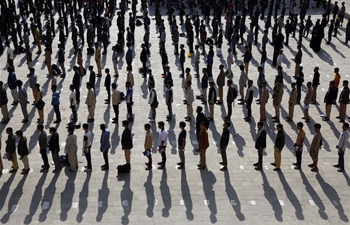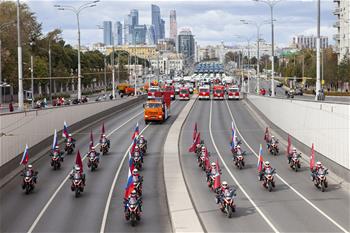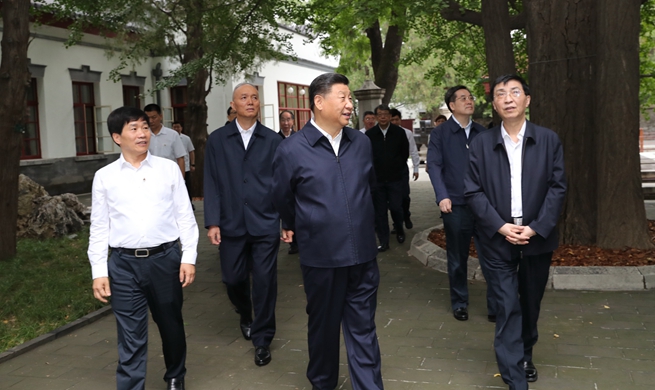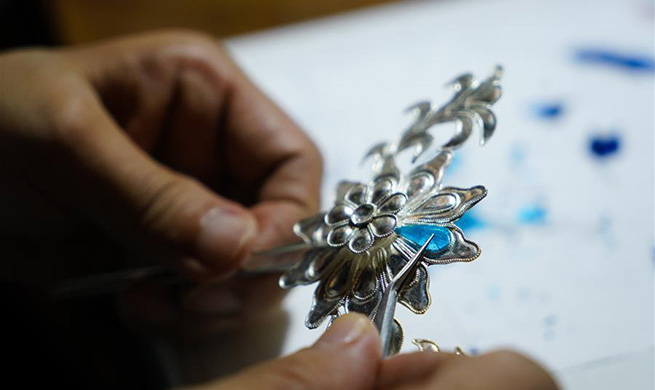by Marwa Yahya
CAIRO, Sept. 15 (Xinhua) -- "Replacing the old tuk-tuks for minivans is not a bad idea. What worries me is that I might not be able to afford the installments for the new vehicle," said Reda al-Bahrawi, 57, owner of a three-wheeled vehicle.
Five years ago, Bahrawi bought the auto-rickshaw with the bonus of his early retirement pension, deeming it a profitable project.
Bahrawi and his son are shifting the work on the tuk-tuk for almost 18 hours per day in Haram, a highly populated district in Giza province, to cover their family living expenses.
On Monday, Prime Minister Mostafa Madbouli told the Ministry of Finance that tuk-tuks should be phased out over the next three years, on the grounds that they are unsafe and unlicensed.
The replacement program will be monitored by the Ministry of Finance in cooperation with other concerned parties, according to a cabinet office press release.
Madbouli has said that the new program to replace the three-wheeled vehicles with gas-powered microbuses will offer thousands of job opportunities, but owners and drivers of the tuk-tuks are worried it could mean the opposite.
New tuk-tuks cost around 34,000 Egyptian pounds (nearly 2,078 U.S. dollars), while microbuses cost at least 90,000 Egyptian pounds. Drivers are being asked to make the difference up in the form of soft loans from the Central Bank of Egypt.
"Still, it isn't clear how the replacement would happen, and how I could pay the difference in prices between the rickshaw and the minivan," Bahrawi told Xinhua.
However, he sees some merits about the decision as the new cars will be more comfortable for the passengers and would cost less fuel if it will be operated on natural gas.
"Also, the minivans will be licensed so I wouldn't have to worry about getting involved into problems with the security men about confiscating the tuk-tuk," he explained, adding that he gets tired of always keeping eyes on his tuk-tuk along the day, fearing it would be stolen or used in criminal activities as he couldn't complain about that for lacking any legal license.
Appearing in Egypt in the late 1990s, the auto-rickshaw spread first in small villages in rural areas where roads are often narrow and unpaved for larger vehicles before heading to the cities.
It is now a popular means of transport that costs a minimum five Egyptian pounds for inhabitants in uneven alleyways where taxis seldom agree to reach.
Reputation of tuk-tuks has been negatively impacted in the past few years because it is mostly driven by children who cause accidents, and might take the dangerous ring road, according to Abdel-Rahman Gamil, who is driving a tuk-tuk at night after coming from his work as a security man in a hospital.
Gamil, who has been driving a tuk-tuk for the past six years, said that the government's swapping decision is good and the minivan will be legalized which will make the passengers, especially women, feeling more comfortable to take.
"Many crimes of robbery and kidnapping took place in many rickshaws but they couldn't be easily traced because of no plates or numbers to check," he explained.
He called on the government to soon unveil more details about conditions of the loans and means of paying it as well as the routes and provinces that could apply it in the short term.
According to the state-owned Central Agency for Public Mobilization and Statistics, only 99,000 tuk-tuks were registered while over 3 million remain unregistered between 2014 and 2016.
Last year, Cairo began a trial scheme to issue number plates for the vehicles, allowing police to monitor them, but it was only a temporary solution which extended to less than 100,000 tuk-tuks.
Mohamed Ibrahim, 23, bought his used tuk-tuk for 10,000 Egyptian pounds last year and praised the government's decision, but he wondered how it could be applied on the large number of owners across the whole country.
He said that the swapping of the tuk-tuk will lead to the improvement of egyptian transportation. "Providing safe, paved and proper roads in the small streets and alleys would be a must for the new minivans."
He also expressed concerns about "what will happen to those who do not exchange their tuk-tuks."
Cabinet spokesperson Nader Saad said the prime minister will soon schedule a meeting with tuk-tuk factory owners to make sure how quickly they can shift to producing minivans.













